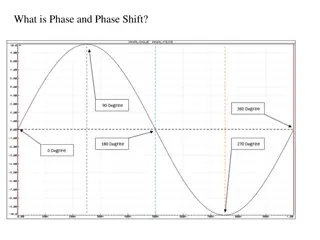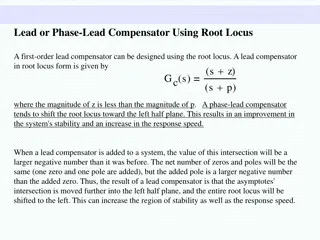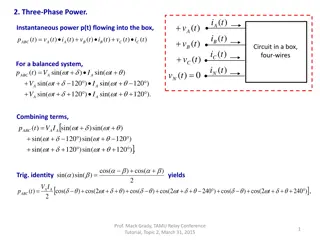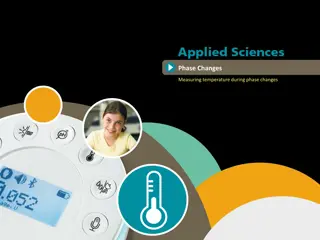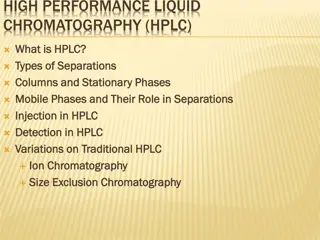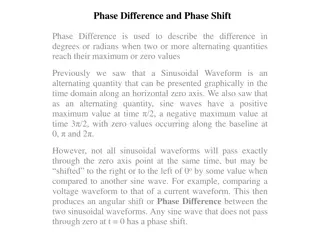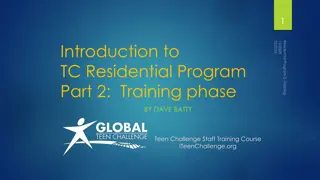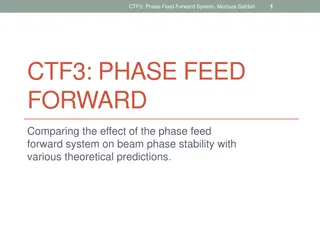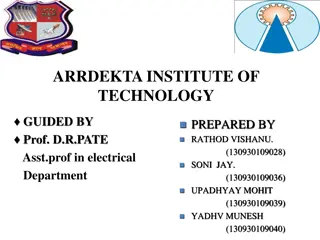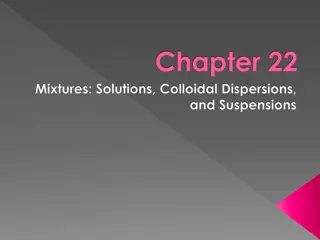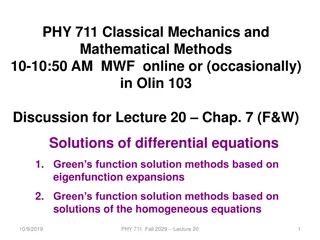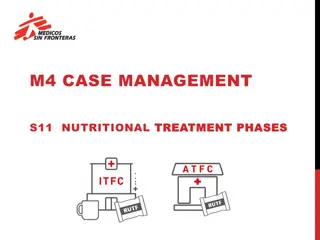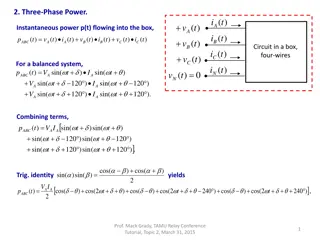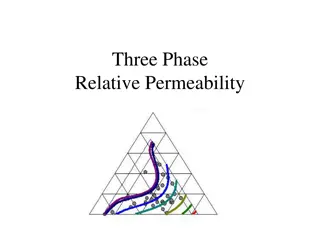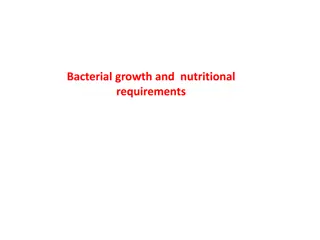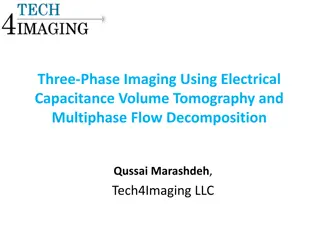Understanding Chemical Potential and Phase Equilibria in Solution Thermodynamics
The chemical potential and phase equilibria in solution thermodynamics are crucial concepts for understanding the behavior of mixtures at varying compositions and conditions. By investigating the fundamental property relation, partial molar properties, and the role of Gibbs energy, we can grasp how
5 views • 25 slides
Kohinoor Teiko Hinjewadi Phase 2 Pune E-Brochure
Introducing Kohinoor Teiko Phase 2, Hinjewadi, Pune's latest new launch project. Experience contemporary living with spacious 2 BHK and 3 BHK flats designed for modern lifestyles. Located in the heart of Hinjewadi, enjoy seamless connectivity, world-class amenities, and unparalleled comfort. Don't m
1 views • 12 slides
Market Segmentation
Market segmentation involves breaking down potential buyers into groups to better understand their needs and behavior. By identifying market segments, businesses can tailor their products, services, and marketing strategies to target specific customer groups effectively. This approach helps in ident
2 views • 48 slides
Silent Generators Market to be Worth $5.6 Billion by 2031
Silent Generators Market Size, Share, Forecast, & Trends Analysis by Portability (Portable and Non-portable), Sound Level, Power Source (Diesel, Gasoline, Natural Gas), Phase, Single Phase, Three Phase), Power Output, and End User (Residential, Commercial) - Global Forecast to 2031\n
0 views • 4 slides
Understanding RC Phase Shift Oscillators
Dive into the world of RC phase shift oscillators, exploring the concepts of phase and phase shift in electronic circuits. Learn how cascading RC networks can achieve specific phase shifts, the role of impedance, and the practical applications of RC feedback networks in oscillator circuits. Discover
1 views • 18 slides
Godrej The Gale Hinjewadi Phase 1 Pune E-Brochure
They are introducing Godrej The Gale, a new launch project in Hinjewadi Phase 1, Pune, offering luxurious 2 and 3 BHK apartments. Nestled in the heart of Hinjewadi, Pune's bustling IT hub, this project promises a perfect blend of modern living and convenience. With contemporary design, spacious inte
2 views • 11 slides
Teacher Certification and Evaluation Program Phases Overview
The Teacher Certification and Evaluation Program outlines requirements for eligible teachers in GPISD, emphasizing ESL/Bilingual certification and proficiency ratings in T-TESS evaluations. Phase I focuses on ESL/Bilingual certification by January 1, 2024, while Phase 2 extends to November 1, 2024,
0 views • 12 slides
Best Agricultural electrician in Tokanui
If you\u2019re looking for an Agricultural electrician in Tokanui, contact Phase Electrical. They work with a high level of professionalism and workmanship, Phase Electrical works on a range of projects, from cow shed fit-outs, to residential electrical work. The versatile team at Phase Electrical h
0 views • 6 slides
Understanding Lead and Phase-Lead Compensators
Lead and Phase-Lead compensators play a crucial role in improving system stability and response speed. By using the root locus and frequency response methods, these compensators shift the root locus toward the left half-plane, adding positive phase over the frequency range. This leads to increased s
0 views • 16 slides
Understanding the Morphology of Flowering Plants: Root and Shoot Systems and Plant Parts
Flowering plants have a typical structure comprising root and shoot systems. The root system is homogenous and consists of roots and branches, while the shoot system is also homogenous and includes the stem, branches, leaves, and flowers. The plant body is divided into vegetative and reproductive pa
0 views • 115 slides
Understanding the Three Stages of Project Life Cycle
The project life cycle consists of three key stages: pre-investment phase, construction phase, and normalisation phase. The pre-investment phase involves objective formulation, demand forecasting, and cost-benefit analysis. The construction phase focuses on building project infrastructure and invest
1 views • 5 slides
Understanding Glycolysis: The Initial Step in Glucose Breakdown
Glycolysis, presented by Dr. Madhu Kumari Gupta, is a crucial process in cellular metabolism that involves the breakdown of glucose to extract energy. This pathway occurs in the cytosol and consists of three main phases - an energy-requiring phase, a splitting phase, and an energy-releasing phase. T
0 views • 12 slides
Understanding Three-Phase Power Systems and Instantaneous Power Flow
This detailed content delves into three-phase power systems, analyzing instantaneous power flow, balanced circuits, and trigonometric calculations. It explores the concept of constant three-phase power and provides insights into the analogy of a piston engine with infinite cylinders. The data includ
2 views • 9 slides
Exploring Temperature Changes During Phase Transitions in Water
Analyze temperature changes in water during phase transitions using an external temperature sensor in a hands-on experiment. Understand the molecular order in different states of matter, the role of heat in phase changes, and the influence of pressure on boiling points.
0 views • 25 slides
Understanding Phase Equilibria in Physical Pharmacy
Delve into the complexities of states of matter, phase equilibria, and the phase rule as explained by Assistant Prof. Dr. Fouad Al-saady in the context of physical pharmacy. Learn about phase definitions, phases in different systems, and examples illustrating phase differentiation in various substan
0 views • 22 slides
Comprehensive Overview of Phase II Periodontal Therapy
Explore the phases, objectives, and treatment methods of Phase II periodontal therapy, including surgical interventions, pocket therapy, and indications for surgery. The treatment plan involves emergency care, nonsurgical therapy, surgical procedures, restorative treatments, and maintenance protocol
1 views • 47 slides
Understanding Features of Rural Society by Dr. Syed Mehdi Abbas Zaidi
Rural society, as explained by Dr. Syed Mehdi Abbas Zaidi, is characterized by agriculture as the primary occupation, dependence on nature, extended kinship groups, traditional practices, religious beliefs, joint family system, kinship dynamics, Jajmani system, homogenous culture, lack of specialize
0 views • 9 slides
Phase 1 Phonics: Developing Early Listening and Speaking Skills
Phase 1 Phonics, the initial stage of Letters and Sounds, focuses on enhancing children's speaking and listening abilities to prepare them for phonics work in Phase 2. This phase emphasizes tuning in to sounds, listening and remembering sounds, and talking about sounds through various activities des
3 views • 17 slides
Understanding Aquatic Adaptation in Animals
Aquatic adaptation refers to the changes in an animal's body organization to thrive in a water habitat. Vertebrates have evolved to lead partial or total aquatic lives, showcasing various adaptations. Water as a habitat offers a homogenous medium, stable conditions, and rich food resources. Aquatic
0 views • 9 slides
Understanding Poly Phase Induction Motor Construction
An induction motor is comprised of a stator and rotor, with the stator featuring a 3-phase winding fed from a 3-phase supply. The rotor comes in two types - squirrel-cage and phase wound. The squirrel-cage rotor consists of heavy bars tightly pressed on the shaft, while the phase wound rotor has a 3
0 views • 47 slides
An Overview of High Performance Liquid Chromatography (HPLC)
High Performance Liquid Chromatography (HPLC) is a powerful analytical technique used for separating and identifying compounds in a mixture. It involves a mobile phase and a stationary phase to achieve separation based on different physicochemical properties. The mobile phase plays a crucial role in
0 views • 20 slides
Understanding the Phase Rule in Physical Pharmacy: Two Component Systems and Equilibrium Phases
The Phase Rule is essential in determining the state of a system based on components and phases. This study explores two-component systems in physical pharmacy, illustrating miscibility behaviors and equilibrium phases through diagrams and explanations. Understanding binodal curves, tie lines, and t
0 views • 12 slides
Understanding Phase Difference and Phase Shift in Sinusoidal Waveforms
Phase difference and phase shift describe the angular displacement of sinusoidal waveforms in degrees or radians. These concepts are crucial in analyzing the relationship between alternating quantities such as voltage and current. The phase angle determines the shift of a waveform along the horizont
1 views • 26 slides
Exploring the Mysteries of Cornstarch and Water Mixtures
Dive into the fascinating world of cornstarch and water mixtures with this engaging experiment. Discover the unique properties of this mysterious substance as it transitions between liquid and solid states based on external forces. Explore the science behind homogenous and heterogeneous mixtures, an
0 views • 20 slides
Training Phase in Teen Challenge Residential Program
The training phase in the Teen Challenge residential program is a crucial period focused on developing drug-free lifestyles, deepening relationships with Jesus, and creating personal recovery and exit plans. Participants follow a structured daily schedule that includes devotions, classes, work progr
0 views • 12 slides
Phase Feed Forward System: Analyzing Beam Phase Stability and Theoretical Predictions
Exploring the impact of phase feed forward systems on beam phase stability through comparisons with theoretical predictions and simulations of increasing limitations. Testing the accuracy of theoretical gain factors and assessing performance using global gain factors. Utilizing specific data files a
0 views • 58 slides
Understanding Three Phase Transformers and Connections in Power Systems
Exploring the fundamentals of three-phase transformers and their connections in power systems, such as star-star, delta-delta, star-delta, and delta-star. Learn about advantages, disadvantages, and applications of these configurations in balanced and unbalanced loads. Discover how three single-phase
0 views • 19 slides
Understanding First-Order Difference Equations in Mathematics
First-order difference equations involve solving both the homogenous and non-homogenous parts to find the general and particular solutions. By using forward substitution and candidate particular solutions, techniques like guessing and summing up the solutions help in solving these equations. This co
0 views • 28 slides
Understanding Mixtures: Solutions, Colloidal Dispersions, and Suspensions
Food mixtures can be classified based on particle size distribution, with the dispersed phase scattered throughout a continuous medium. Solutions, a type of mixture, consist of a solute (dispersed phase) and a solvent (continuous phase), forming a homogenous blend. Factors like temperature, particle
0 views • 80 slides
Classical Mechanics and Mathematical Methods Lecture 20 Overview
The lecture covered solutions of differential equations using Green's function methods based on eigenfunction expansions. Topics included finding formal solutions, motivations behind Green's functions, and understanding Sturm-Liouville equations for homogenous and inhomogenous problems. Students had
0 views • 29 slides
Understanding Solid Mixing Mechanisms and Equipment
Solid mixing involves processes like convective, shear, and diffusive mixing which randomize dissimilar particles in a system. Factors affecting solid mixing include particle size, distribution, and properties like density and elasticity. Various mechanisms like tumbling mixers are used for solid mi
0 views • 16 slides
Understanding Nutritional Treatment Phases in Pediatric Malnutrition
This session covers the different phases of nutritional treatment in pediatric malnutrition programs, focusing on objectives, specifics, and criteria for transitioning between phases. An illustrative case of Annika, a 3-year-old in the Transition Phase, is provided for practical application and unde
0 views • 5 slides
Understanding Homogenous Chemical Equilibrium
Homogenous chemical equilibrium occurs when reactants and products are in the same phase. This equilibrium remains independent of the volume of the reaction mixture. The concept is illustrated through the example of the Hydrogen-Iodide system and a generic reaction A + B --> 2C. Partial pressure pla
0 views • 56 slides
Understanding Three-Phase Power Systems
This content discusses three-phase power systems, including instantaneous power flow, balanced systems, and trigonometric identities. It delves into the concept of smooth running machines in relation to three-phase power, analyzing the constant nature of instantaneous power. The analogies to a pisto
0 views • 7 slides
Understanding Three-Phase Relative Permeabilities in Reservoir Engineering
Explore the application, correlations, and traditional assumptions of three-phase relative permeabilities in reservoir engineering. Learn about saturation-dependencies, occupancy models, and the challenges of measuring three-phase relative permeabilities. Discover how to calculate three-phase permea
0 views • 14 slides
Understanding Microbial Growth: Phases and Dynamics
Microbial growth is defined as an increase in cellular constituents leading to a rise in microorganism size or population. The growth of bacterial cells is characterized by distinct phases such as lag phase and exponential phase. During the lag phase, cells are synthesizing new components before div
0 views • 21 slides
Understanding Bacterial Growth and Nutritional Requirements
Bacterial growth involves processes like binary fission, exponential phase, and stationary phase. Factors influencing growth include nutrient availability, oxygen levels, and toxic waste accumulation. Lag phase precedes exponential growth, where cells prepare for division. Stationary phase occurs wh
0 views • 11 slides
Phase II Trial Design in Oncology Drug Development by Wendy R. Parulekar, MD, FRCP
This presentation covers the pivotal role of Phase II trials in oncology drug development, emphasizing the importance of preliminary clinical efficacy screening, adverse event profiling, mechanism of action understanding, and target population definition. It discusses various Phase II trial designs,
0 views • 76 slides
Advanced Imaging Techniques for Three-Phase Flows in Reactor Systems
Gas-liquid-solid reactor systems require advanced measuring techniques to understand complex three-phase flows. Multi-Phase Flow Decomposition using Electrical Capacitance Volume Tomography (ECVT) offers innovative solutions for visualizing and quantifying phase hold-up distributions and dynamic cha
0 views • 17 slides
Moving to the Design Phase: Feasibility Phase Checklist
The transition requirements for moving to the Design Phase include the Water Fund being deemed feasible, resources committed for design, and a formal decision made. The Feasibility Phase Checklist covers governance, science, finance, implementation, and communications aspects. The high-level action
0 views • 4 slides




